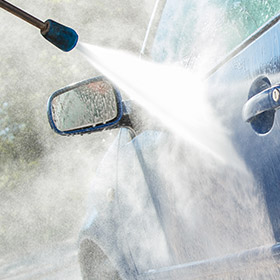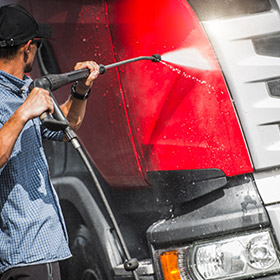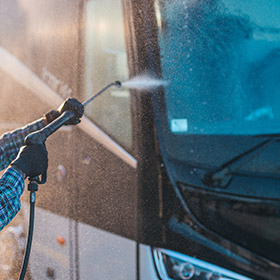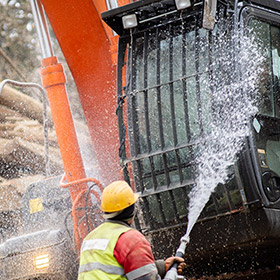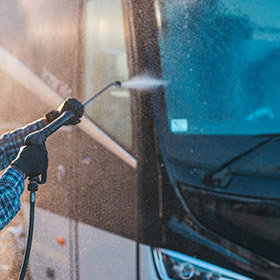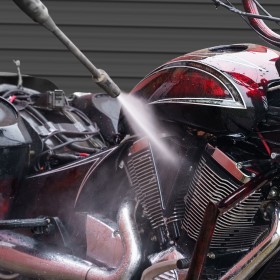Wash bays for any commercial application
Cleanawater can help you install a wash bay system that meets the standards of your local area. Sometimes, triple interceptors or an oil water separator isn’t enough. Cleanawater's wash bay equipment will help you meet their strict criteria.
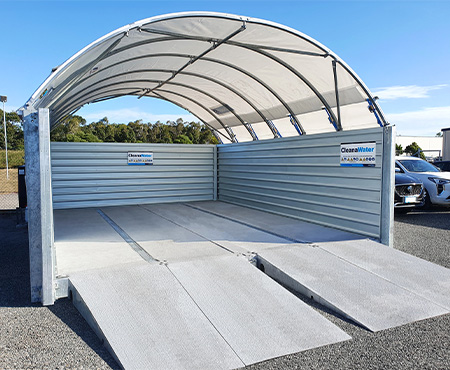
Portable wash bays
A portable wash bay system offers a convenient and adaptable solution for sites where flexibility is key, such as above ground wash bay installations. They can be quickly installed, moved, or decommissioned to save time—perfect for temporary locations. Additionally, these units are easily configured to meet AQIS requirements and support water recycling efforts.
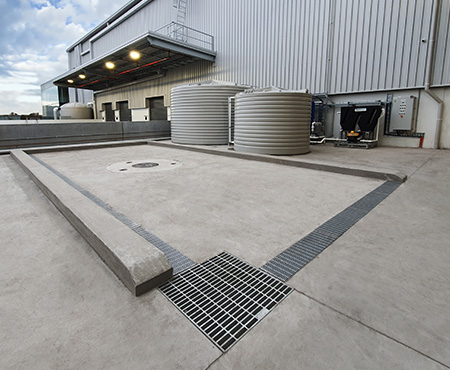
Permanent wash bays
A permanent wash bay provides businesses with an excellent, long-term solution for keeping their operations in line with local regulations.
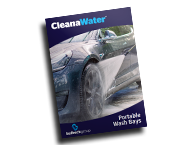
For more information on product specs, site layout diagrams and operation manuals view our document library
Wash bays for all vehicle types
Cleanawater's permanent and portable wash bay solutions can be customised for your business needs and specifications. Or if you already have a set up, our team can work with you on how to implement our equipment into your existing systems, ensuring that it is set up correctly and that you continue to remain compliant. Either way, you'll benefit from Cleanawater’s 20 years of wash bay expertise across a wide range of vehicle types and industries.
Need more information? Get in touch with an expert
Heavy duty wash bays for efficient wastewater removal
Need a wash bay that meets local authority standards? CleanaWater's portable and permanent car wash bay equipment ensures full compliance. Our plug-and-play systems are ready for immediate use, or we can design a custom solution tailored to your site, including setups for construction projects.
How our wash bays work
A wash bay floor is created during our construction process. This creates a platform where vehicles and equipment can be positioned for cleaning. Wastewater from the cleaning process is collected using water recycling systems that keep the water for future processing.
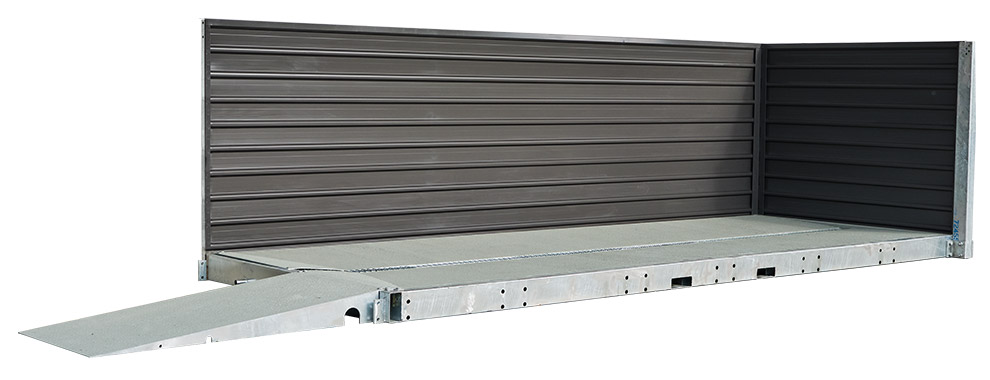 External water connection ports ensure no leaks between ground modules
Watertight construction ensures no leaks and no contamination of surrounding ground area
Wind loaded rated walls which cater to most environments across Australia
A specially selected non-slip polyurethane coating is pre-applied to the deck & ramps to improve safety and prevent slipping
Robust construction can carry weight loads of up to 12 Tonne per axle
Hot-dip galvanised steel protects the structure from the harsh Australian environment
External water connection ports ensure no leaks between ground modules
Watertight construction ensures no leaks and no contamination of surrounding ground area
Wind loaded rated walls which cater to most environments across Australia
A specially selected non-slip polyurethane coating is pre-applied to the deck & ramps to improve safety and prevent slipping
Robust construction can carry weight loads of up to 12 Tonne per axle
Hot-dip galvanised steel protects the structure from the harsh Australian environment
Customer reviews
I have been a plumber for over thirty years and installed many water treatment systems. CleanaWater systems are by far the best for quality and reliability. They provide excellent customer service, from sales staff right through to expert advice and technical help. Can't thank CleanaWater enough!
Iain Paterson, Multilple Trades and Maintenance
We have seen a fantastic improvement since the OdourPro VapourGard™ system was installed 3 years ago. The system mitigates the heavy odours which are released from the site, which has improved conditions for our staff and almost completely eliminated complaints from local residents and businesses
Glenn Claverie, Select Civil
The whole process was very simple, the sales and technical support was great, when needed contact was made easily for assistance during construction and the finished product works and looks fantastic, all in all working with the CleanaWater team to purchase our new Portable Wash Bay was a trouble free process
Doug Neil, Stihl Sales and Service Centre Coffs Harbour
The purchasing of our oil separator, from obtaining a quote through to delivery, was made extremely easy through CleanaWater, the staff are easy to deal with and make the whole process hassle-free, as well as supplying a quality product. I would highly recommend CleanaWater products in the future.
Bret Sheehan, Surefire Plumbing Services
The VapourGard™ system is a great alternative to the other odour suppression systems out there. The unit is easy to use and maintain, does not need a portable water source to dilute the chemical and has a low chemical usage which cuts down on cost.
Nicholas Bhugon, SITA Australia
Cleanawater have been very helpful in getting the solution ordered and out the door to us as quickly as possible. All this in the midst of supply chain issues globally. It’s nice when things still, just, work!
Tom Filipcic, FUCHS Lubricants (Australasia) Pty. Ltd.
In combination with a wide range of operational controls, we have found that complaints from our neighbours have significantly reduced since the VapourGard was installed.
Rebecca Tempest - Manager, Resource Recovery & Waste Services, Blue Mountains City Council
Frequently asked questions
How do I know if my vehicle wash down bay is compliant with local authority regulations?
If you are unsure, call Cleanawater. Typical unroofed wash down bays require perimeter bunding, a holding pit, a diversion system and a pre-treatment device to treat wash down water and should not allow run-off to a storm water drain or adjacent area.
How do I best retain solids that accumulate in my wash down practices?
Silt traps and baffled pits are effective measures to retain solids for easy scheduled removal. Beach pits/drive in sumps are excellent for high solids wash down environments.
Cleanawater also offers a range of sludge settling silos to help capture sludge and reduce the maintenance required for clearing the oil water separators.
Do I need any equipment to treat wash down water?
An approved pre treatment device is required to treat wash down water in wash down bays. Simply allowing wash water to discharge into drains is strictly not permitted. Unroofed wash down bays over 20m2 may require a first flush diversion system to divert rainwater to stormwater.
I don’t have sewerage on site, can I still install a wash down bay?
In the absence of sewer, other approved discharge methods include leach drains, evaporative ponds or holding tanks. Regional areas who are on septic should contact the local shire or council for advice on where to discharge treated wash water.
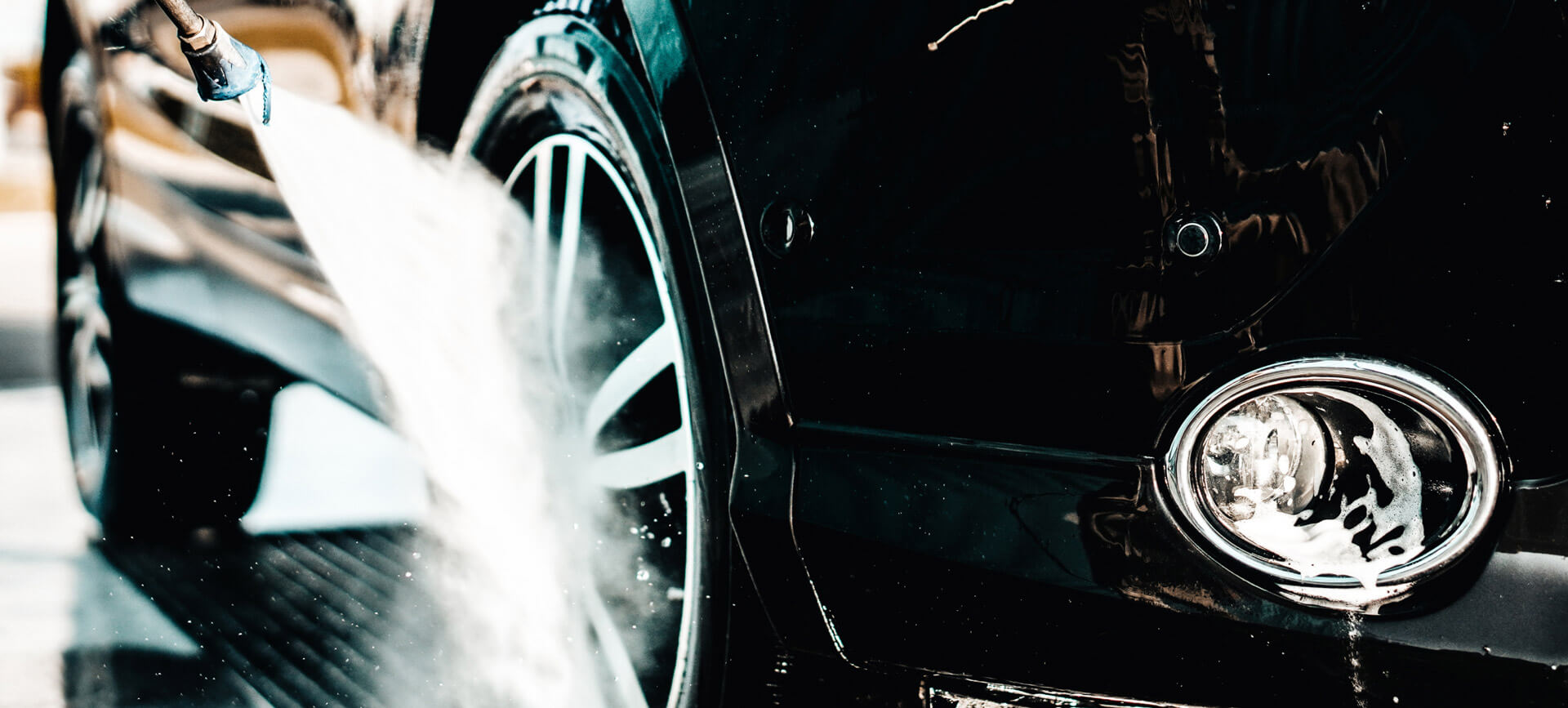
Enquire about our Wash Bays
We have representatives in
Newcastle
Mayfield West
NSW 2304
Sydney
Sydney
NSW 2000
Melbourne
Thomastown
VIC 3074
Brisbane
Geebung
QLD 4034
Perth
Osborne Park
WA 6017
Adelaide
Wayville
SA 5034

